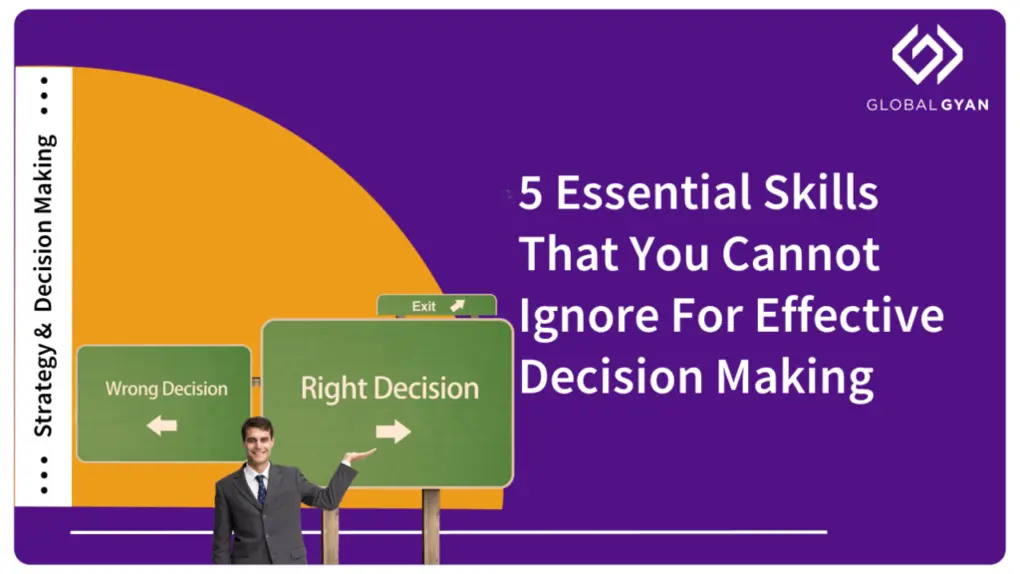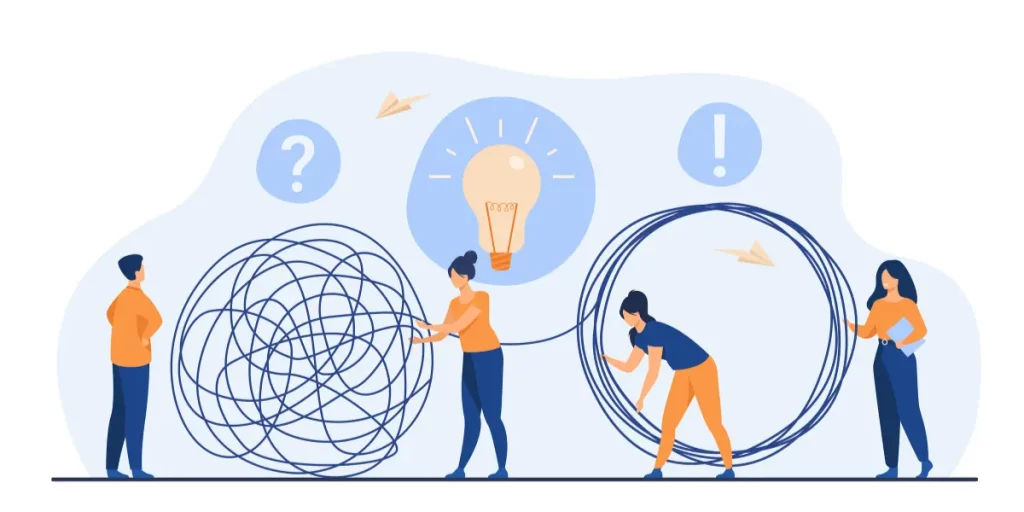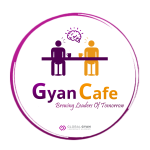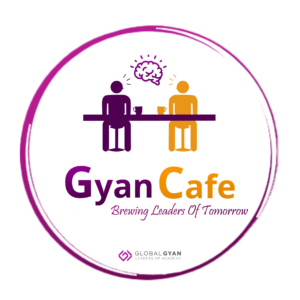5 Essential Skills That You Cannot Ignore For Effective Decision Making


Introduction
Decision making is crucial to the functioning of an organization or any life for that matter. As managers or leaders, your team and organization look up to you to make effective decisions almost every day.
It is a fact that the possibilities of achieving business goals and objectives rest on the sole act of decision-making. However, let’s first understand what is effective decision making. Effective decision-making is the ability to choose between appropriate choices to achieve the best results for the company and its workforce in a limited time considering the needs and interests of the group.
But that doesn’t mean that an impulsive ‘Ready-Aim-Shoot’ is the key. This approach rarely achieves the right goals. It is a structured process that involves a methodical approach of identifying challenges, devising solutions, weighing options, making an informed choice and aligning all to the decisions taken.
For aspiring managers, business owners and leadership teams making decisions in difficult and time-limited situations is never easy especially in an increasingly ambiguous environment that either challenges you with influx of information and data, limited information or absolute uncertainty.
You need to develop and keep honing your decision-making skills to demonstrate effective decision-making ability. The good thing about these skills is that you can learn and develop them. When it comes to brass nails of things, here are the top 5 skills for effective decision-making skills you need to have to ensure you lead with team and organisation with confidence and conviction:
The 5 essential skills for making effective decisions:
Skill 1 : Problem-Solving and Critical thinking
A great deal of what goes on in a business is decision making and problem solving. That’s why it’s necessary for aspiring leaders to learn critical thinking skills – an integral part of problem-solving and decision making process.
Simply put it is the act of thinking clearly through options to arrive at a suitable choice. It involves logic, reason, creativity, objectivity and thoroughness to make sound choices. The beauty of critical thinking is that it helps you to gauge whether the choices you are making are sound and aids better decisions. But it’s not something that only comes easily to some people. It requires practice and effort if you want to get great at it.
The good news is that you can develop and master the art of developing problem-solving and critical thinking skills by developing a curious mindset and a conscious habit to ask the right questions. Once you make critical thinking as your second nature it will lead you to faster, more confident and effective decision making and will hold you in good stead to guide your team/organization to the best solution.
Skill 2: Build strong Data interpretation and analysis skills
Data Driven decision making negates the chances of making poor decisions. It basically means that you are harnessing the power of data, information, market trends, insights into what has worked in the past to make decisions for the future and not on feelings, opinions, or experiences.
To be an effective decision maker one trait that you should have is clarity of purpose. Like having a clarity on what kind of data you need to collate, ensuring the data sources are reliable, that data collated is accurate cum high in impact and ranks low on complexity.
Equally important is to build strong data interpretation and analysis skills like identifying trends, patterns and presenting them in simplified visual manner enables to sieve your thoughts, take clear decisions and make better pitch to stakeholders for concurrence.
The bottom line is strong data analytics and interpretation skills allows you to do better risk assessment and management and arrive at effective decisions that works in your teams and organisation’s favour.
Skill 3: Humility and active listening
As a leader, the most important decision-making skill you need is humility and being an active listener. It essentially means listening actively and openly. You need to set aside preconceived notions, assumptions and egos and consciously work from a zone of curiosity, sincerity, mutual respect and candour.
It is about staying open to suggestions of colleagues and subordinates which may be better than yours. Alternatively, a colleague may act as the Devil’s advocate and ask questions about your decision. No matter who makes the suggestion or what role they play, it is about being welcoming feedback, suggestions, alternate views and inputs so that you are not driven only by your own thought process. With this you can assimilate the inputs with your own know-how, experience, analysis and evaluate them in a structured manner to make the right choices.
Being a good listener and working from the zone of humility leads to better collaboration. You will be able to engage better, be well informed about the project, process, earn respect of your team and colleagues and have a good sense of morale and interests of the employees. Remember the entire decision-making process is profoundly strengthened with active listening skills.
Skill 4: Time Management
Practising efficiency and scheduling plays an important role in the process of decision-making. Sometimes, you can choose to spent more time in the evaluation and creation of possible solutions as that may be critical to speed up a final decision. The art of time management is vital for effective decision-making process. You need to know what areas to focus on and how to allocate your time accordingly that can help you complete the decision-making process quickly and efficiently.
Skill 5: Effective Communication
Effective communication is another important skill you need as a decision maker. It all starts with a clear understanding of who are the stakeholders who would be party to the process of decision making and who would the decisions impact. Often inadequate or ineffective communication impedes decision-making wherein the stakeholders across levels may develop wrong perceptions of issues or misinterpret the merits of making certain decisions.
Closing the gap between how much people know and what they think they know weighs heavily on one’s ability to make good decisions. It is important that a strong communication process is built around the decision making process that is anchored on transparency, authenticity and team work.
Even the selection of appropriate modes of communication factoring the context and implications plays a crucial role in seamless decision-making process. Let’s say if the situation merits in-person conversations or team address do not hesitate to come forward to communicate with authenticity, clarity and purpose rather than relying on impersonal modes like mails etc.
It’s important to be aware of and in control of your emotions as you make decisions, express yourself clearly and directly as you analyze options and present your final decision. Once you are in control of your emotions, decision making becomes more unbiased.
In short, effective communication skills that entails careful communication planning, management, delivery and taking measures to enhance consistency and clarity goes a long way in arriving at sound decision making process.
Conclusion
Effective decision-making leads to better workplace productivity, establishes trust, reduces conflicts and in pressing situations it helps to create action plan to move ahead mindfully. What manager, business owners, leaders can do is blend in their experience, knowledge, essential skills to arrive at a well-informed decision that essentially cuts through the noise of data and zeros in on the crux of the matter. Risk taking and intuition is also part of a decision -making process however the more you work on developing these 5 essential effective decision- making skills, the more efficiently you can shape yourself as an ace and effective decision maker. So, keep practicing and keep leading!





